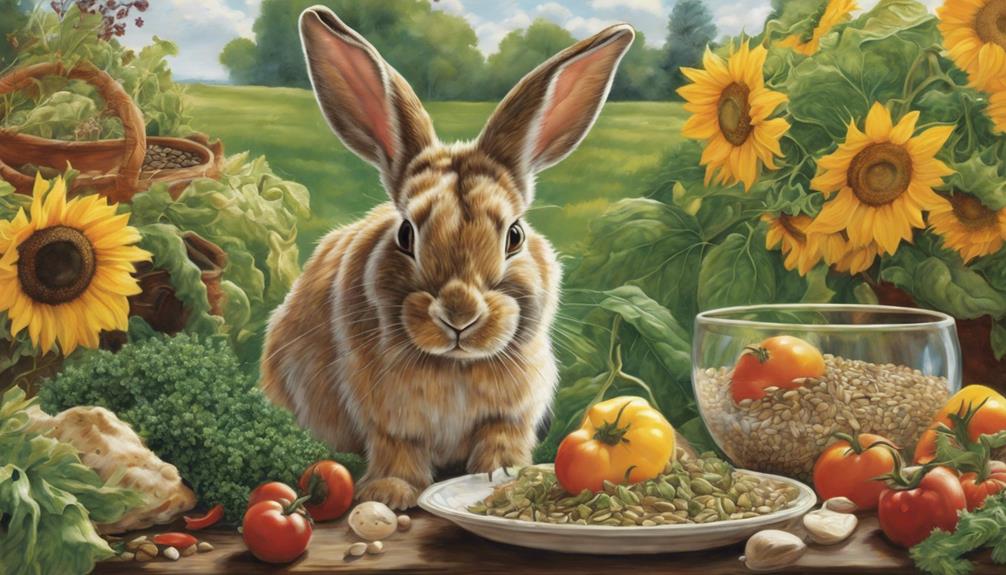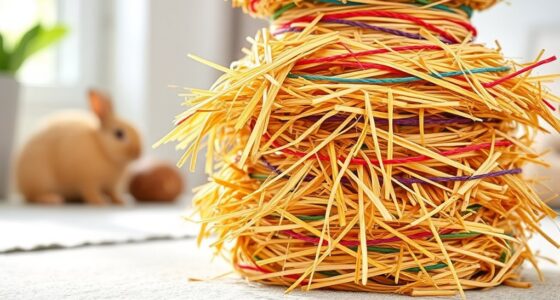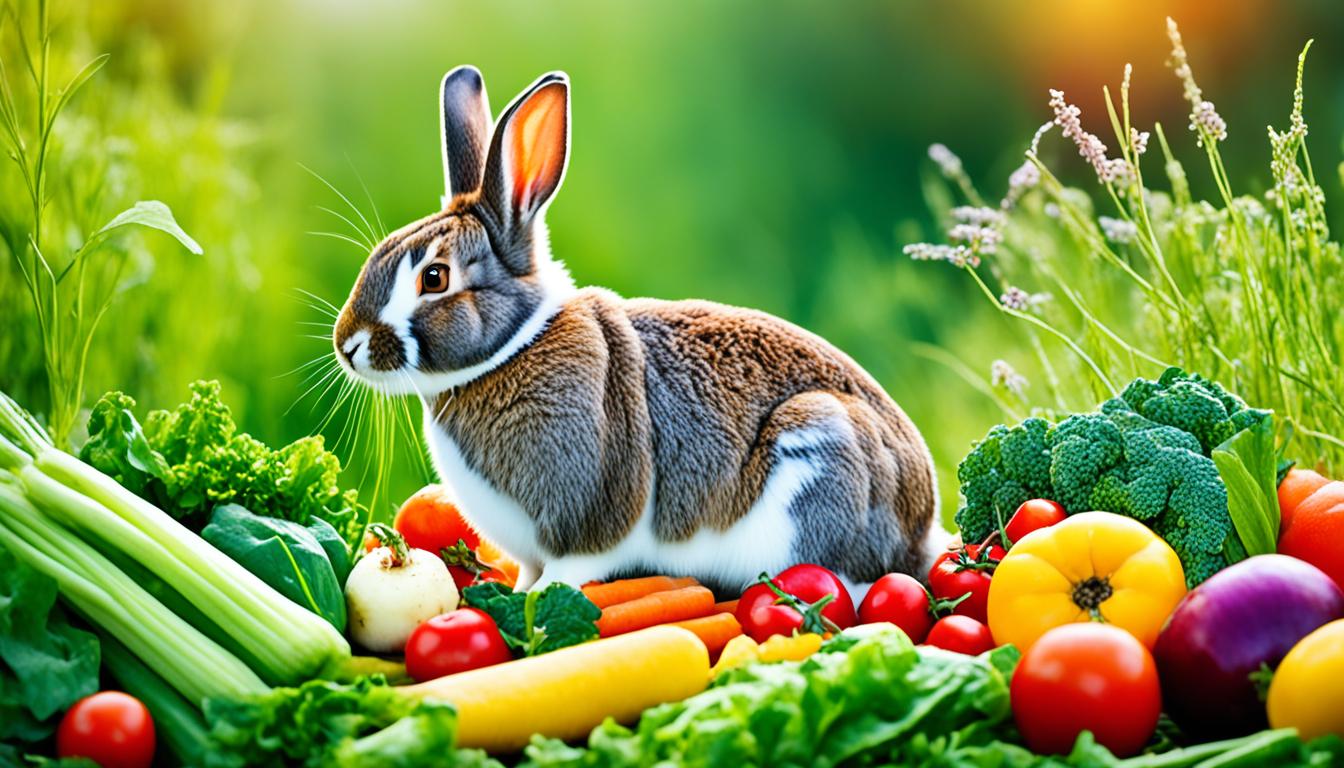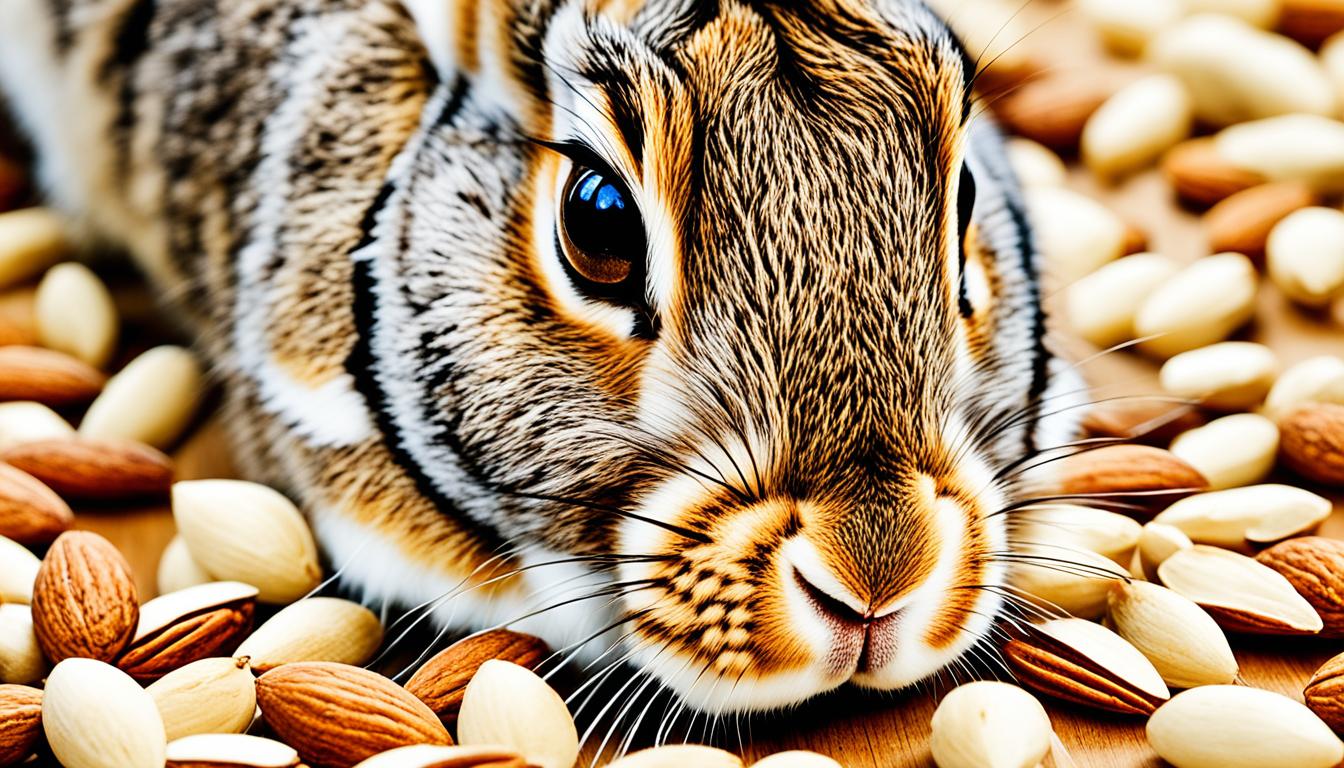Did you know that rabbits have intricate digestive systems that necessitate a specific diet to maintain good health? Despite rabbits being recognized for their fondness for leafy greens and hay, their culinary choices go beyond these basics. One unexpected fruit that can be included safely in a rabbit’s diet is kiwi. But, how much kiwi is considered safe for them to consume? Let’s delve into the subject and examine some crucial pointers for feeding kiwi to rabbits.
Key Takeaways:
- Kiwi can be safely fed to rabbits, but moderation is key due to its high sugar content.
- Feeding kiwi to rabbits in limited amounts can provide essential nutrients and vitamins.
- Excessive kiwi consumption can lead to digestive issues, obesity, and other health risks in bunnies.
- Observing a rabbit’s behavior can help determine if they enjoy the taste of kiwi.
- Consulting a veterinarian before introducing new foods into a rabbit’s diet is crucial.
What Are the Benefits of Feeding Rabbits Kiwi?
Kiwi is a nutrient-rich fruit that can be a beneficial part of a rabbit’s diet. It contains essential vitamins and minerals like vitamin C, vitamin E, potassium, and magnesium. Kiwi is also low in fat and calories, making it a suitable snack for rabbits prone to obesity.
It is an excellent source of antioxidants, which can protect against diseases and promote digestive health. These antioxidants help to neutralize harmful free radicals and reduce inflammation in the body. Furthermore, kiwi is rich in fiber, which aids in digestion and promotes regular bowel movements.
Feeding rabbits kiwi in moderation can provide various benefits:
- Boosting the immune system: Kiwi is packed with vitamin C, which is essential for maintaining a healthy immune system in rabbits. A strong immune system helps rabbits fight off infections and stay healthy.
- Promoting healthy skin and coat: The vitamin E content in kiwi contributes to healthy skin and a shiny coat in rabbits. It helps to protect the skin from oxidative damage and keeps the coat soft and lustrous.
- Supporting heart health: Kiwi contains potassium, which is vital for maintaining a healthy heart rhythm and blood pressure in rabbits.

Feeding rabbits kiwi in moderation can provide various benefits, including boosting the immune system, promoting healthy skin and coat, and supporting heart health.
What Are the Health Risks of Feeding Rabbits Kiwi?
Feeding rabbits too much kiwi can pose several health risks for these furry friends. While kiwi can be a tasty treat for rabbits, it should only be given in moderation and in limited amounts to avoid potential issues.
One of the primary concerns of feeding rabbits excessive kiwi is the risk of digestive issues. Rabbits have sensitive stomachs, and consuming too much kiwi can lead to an upset stomach and diarrhea. Additionally, kiwi has high sugar content, which can disrupt the delicate balance of gut bacteria in rabbits, resulting in imbalanced gut flora and potential digestive problems.
The high acid content in kiwi can also be detrimental to rabbits’ health. Excessive consumption of kiwi can lead to the development of ulcers and cause dehydration in rabbits, as the acid can have a diuretic effect. To prevent these health risks, it’s crucial to limit the amount of kiwi given to rabbits and monitor their response.
Moreover, kiwi is high in sugar, which can contribute to obesity and other related health issues in rabbits. Obesity can lead to various health problems, including joint pain, respiratory issues, and a reduced lifespan. Therefore, it’s essential to consider the overall sugar intake and balance it with other appropriate foods in a rabbit’s diet.
To minimize the health risks associated with feeding rabbits kiwi:
- Offer kiwi as an occasional treat rather than a regular part of their diet.
- Give kiwi in small amounts to prevent digestive disturbances.
- Monitor the rabbit’s reaction to kiwi and discontinue if any adverse effects occur.
By following these precautions, you can ensure your rabbit’s well-being while still providing them with a small taste of the delicious kiwi fruit.

How Can You Tell if Your Rabbit Likes the Taste of Kiwi?
It can be challenging to determine if a rabbit enjoys the taste of kiwi since they cannot verbally communicate. However, you can observe their behavior to gauge their preference. If a rabbit eagerly eats kiwi, licks its lips, and wants more, it likely enjoys the taste. On the other hand, if a rabbit rejects kiwi and avoids it, it may not enjoy the taste. Even if a rabbit doesn’t like the taste, kiwi is still safe for them to eat in moderation.
To gauge your rabbit’s affinity for kiwi, pay close attention to their reactions when you offer them this delicious fruit. If they eagerly munch on it, it’s a good sign that they enjoy the taste. Look for their lips being licked or signs of curiosity, such as sniffing or nudging the kiwi. These behaviors indicate that the rabbit is likely enjoying the flavor and texture of the fruit.
On the other hand, if your rabbit shows disinterest, turns away, or avoids the kiwi altogether, it might not be their preferred taste. Each rabbit has its own unique preferences when it comes to food, and they may not be fond of kiwi. In such cases, it’s essential to respect their preferences and not force them to consume it.
It’s important to remember that rabbits have delicate digestive systems, so even if your rabbit likes the taste of kiwi, it should be fed in moderation. Always monitor their reaction and behavior after eating kiwi, as excessive consumption can lead to digestive issues such as diarrhea or upset stomach.
Observing Rabbit Behavior
Rabbits often exhibit certain behaviors when they enjoy the taste of a particular food. Look out for the following signs to determine if your rabbit appreciates the flavor of kiwi:
- Eagerly eating and crunching on kiwi pieces
- Licking their lips or licking their paws, which is a common behavior rabbits display when they enjoy the taste of food
- Potentially showing interest and excitement by nudging or pawing at the kiwi
- Actively seeking more kiwi or displaying eagerness for additional servings
It’s crucial to introduce new foods gradually into your rabbit’s diet, including kiwi, and always consult with a veterinarian before making any dietary changes to ensure your rabbit’s overall well-being.
To summarize, determining whether your rabbit enjoys the taste of kiwi requires careful observation of their eating behavior and reactions. While rabbits can’t directly communicate their preferences, you can rely on cues such as their level of interest, eagerness, and enjoyment. Remember to offer kiwi in moderation, even if your rabbit enjoys it, to avoid any potential digestive issues and to maintain a balanced diet.
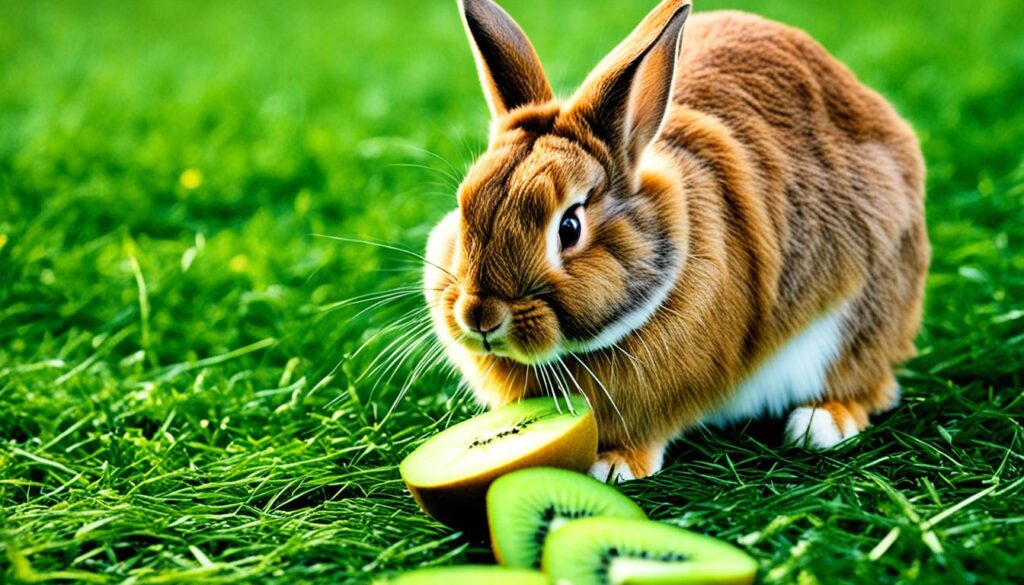
How Much Kiwi Can Rabbits Safely Eat?
Rabbits can safely enjoy kiwi as part of their diet, but it’s crucial to provide it in moderation. Kiwi should only make up a small portion of their daily food intake, ideally between 5-10%. Feeding kiwi excessively can lead to potential health issues in rabbits, such as digestive problems and obesity.
The recommended serving size for kiwi is no more than 1 teaspoon per 4 lbs of body weight. This serving should be divided into two smaller portions per day to ensure optimal digestion. It’s essential to monitor your rabbit’s reaction to kiwi and adjust the serving size accordingly.
Note: It is important to remove the kiwi skin before feeding it to your rabbit. The skin can be difficult for rabbits to digest and may cause gastrointestinal issues.
| Rabbit’s Weight | Serving Size | Number of Servings per Day |
|---|---|---|
| 1-2 lbs | 1/4 teaspoon | 2 |
| 2-4 lbs | 1/2 teaspoon | 2 |
| 4-6 lbs | 3/4 teaspoon | 2 |
| 6-8 lbs | 1 teaspoon | 2 |

Remember, while kiwi can provide beneficial nutrients, it should not be the main component of a rabbit’s diet. High sugar content in kiwi can be detrimental to their health if consumed excessively. Make sure to offer a variety of other safe foods such as hay, leafy greens, and pellets to maintain a balanced diet for your pet rabbit.
Conclusion
In conclusion, rabbits can enjoy the occasional treat of kiwi, but it should not be a regular part of their diet. While kiwi does provide some health benefits, such as essential vitamins and minerals, it is important to remember that it is also high in sugar.
Feeding rabbits too much kiwi can lead to digestive issues and obesity, which can negatively impact their overall health and well-being. It is crucial to consult with a veterinarian before introducing any new foods into a rabbit’s diet.
If you decide to offer your rabbit kiwi, it should be given in moderation and in small amounts. Monitoring their reaction is essential. If you notice any adverse effects, such as upset stomach or refusal to eat, it may be best to avoid feeding kiwi to your rabbit.
Remember, the key to safe feeding is maintaining a balanced and nutritious diet for your bunny. Stick to high-quality feeding hay, leafy greens, and pellets to ensure their optimal health and happiness.


